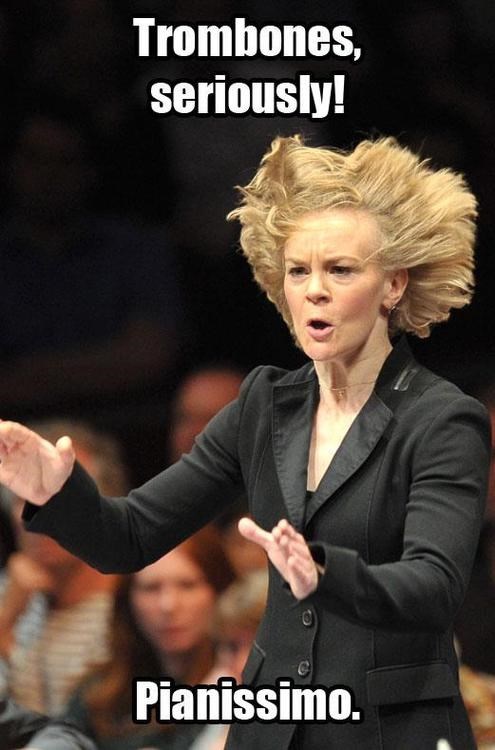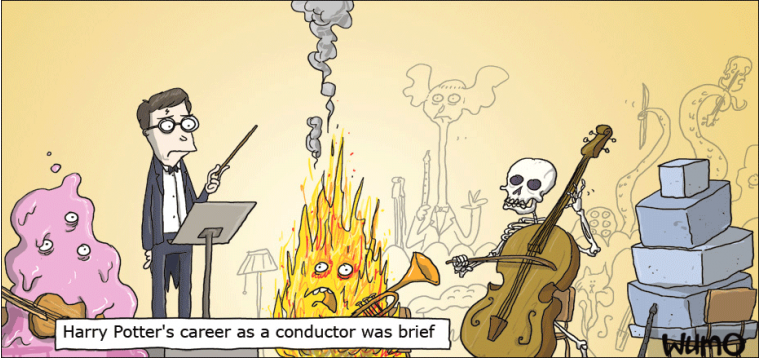What the hell do conductors do anyway?, Pt.1
Being the sophisticated readers that you are, I have no doubt that at some point in your life you started to suspect, just as I did, that there’s more to conductors than meets the eye. That guy (usually, but girl also) can’t be just waving his hands around like a madman trying to signal a plane for no reason. I mean, this stuff looks exhausting, there’s surely something else going on, right? Well, there is.
There are the musicians, each doing their own thing, and then there is the conductor – doing everyone’s thing simultaneously while seemingly producing nothing with all the weird pointing and gestures we all find so funny and enigmatic at the same time. Just like the guy who mastered your favorite album, he’s responsible for the wholeness of the sound, the completeness and coherency of the music that is being played. To use the good old cliché, the conductor is the person who plays the orchestra.
 Let’s just try to imagine the set of skills you would need to keep both the music piece and the whole of the orchestra in equilibrium and synchronicity. It. Is. Huge. The question is, does all of this translate into comprehensible information solely through hand gestures? This is, indeed, a real problem not only for us, mere mortals, but for classical musicians and conductors themselves. Just like every person in the world, but in a very professional, situational sense, a conductor is bound to ask himself “Why am I here?” at least once in his carreer. For some unfortunate souls, this may last a lifetime.
Let’s just try to imagine the set of skills you would need to keep both the music piece and the whole of the orchestra in equilibrium and synchronicity. It. Is. Huge. The question is, does all of this translate into comprehensible information solely through hand gestures? This is, indeed, a real problem not only for us, mere mortals, but for classical musicians and conductors themselves. Just like every person in the world, but in a very professional, situational sense, a conductor is bound to ask himself “Why am I here?” at least once in his carreer. For some unfortunate souls, this may last a lifetime.
Lights on. The conductor starts conducting. Audiences wonder what’s happening and IF something’s happening at all. Players, of course, having survived through countless chiefs before, think they can do better if they just get the chance. Even conductors sometimes doubt their own purpose. As Mitropoulos put it, it’s a “bastard profession.” You’re seemingly doing none of the work but in the end you get the credit and the money. This, of course, can induce quite the guilt in a conductor’s soul.
What about messing up? A violinist can mess up in his living room while practicing or live on stage but still, he’s ONE musician. Plus, his mistake would be a one-time thing, a sudden lack of concentration, a slip of a finger. A musician fails occasionally and concretely. A conductor’s mistake is conceptual, it’s an error in principle. Before the time of the performance it all sounds well in his head until it turns out to have been bad all along. This realization is in no small part related to the audience’s reaction or lack of appreciation but still, it happens in front of all the world to see. The worst part is – if the musicians screw up, it’s entirely possible that the conductor is the one who takes all or most of the blame. Imagine that kind of stress and responsibility. It’s like being a parent to a whole orchestra.
 Even if it’s not obvious, a lot of great conductors are actually shy. It’s ridiculously difficult to successfully manage a large group of musicians and create a dynamic, working environment. You can imagine what a challenge that would be for an introvert. And that’s only the social part of it – talent, a perfect sense of music and the ability to interpret a complex musical piece with a good concept and into a likable whole requires a totally different set of qualities. Not to mention being able to translate it into minimal physical movement which musicians can decode and turn into a beautiful performance which should immaculately express your idea and vision of the piece. Crazy.
Even if it’s not obvious, a lot of great conductors are actually shy. It’s ridiculously difficult to successfully manage a large group of musicians and create a dynamic, working environment. You can imagine what a challenge that would be for an introvert. And that’s only the social part of it – talent, a perfect sense of music and the ability to interpret a complex musical piece with a good concept and into a likable whole requires a totally different set of qualities. Not to mention being able to translate it into minimal physical movement which musicians can decode and turn into a beautiful performance which should immaculately express your idea and vision of the piece. Crazy.
But back to the people skills. If you’re not a shy person, imagine for a moment that you are. Try to envision this: not only do you have to let a crowd of people inside your inner world, but you have to gently, but firmly, ask them to express it for you and guide them through the process. Author Justin Davidson nailed the definition of conducting when he called it emotional ventriloquism. Again – craaazy.
And what about leadership? You can’t just walk into a room full of strangers, tell them what to do and expect everything to go smoothly. Orchestras can judge you in minutes. They can see right through you and stare into all your insecurities because you’re not the first conductor they’ve been working under – and you won’t be the last. Scary thought, huh? To lead people means to be confident. And in the context of classical music that’s something you can neither fake, nor make appear out of thin air. You have to project the sense that you’re supposed to be where you are and there’s a good reason for that. But to imply this, you have to be sure of it first.
Next, knowledge. Superhuman knowledge to be exact. A conductor must “know the score”. This sounds a bit frightening as it is, but trust me, when you understand what it really means, things start to get truly horrifying. Let’s start with something small: if you’re a driver, there’s probably a street, a route, a few miles of road that you drive regularly and really know. You know every stone on every turn, every road sign, every bump and puddle – you can effortlessly and safely navigate through them with your eyes closed and one hand tied behind your back.

Now imagine the street was a hundred times longer and there were a hundred more details to remember about it. And it’s not just one street, but a hundred. And that’s just in your city – there’s an equally large number of crazy-long streets in 20 more cities that you all know like the back of your hand. Are you imagining this? Because that’s just what conductors do – they remember. This insane level of familiarity in the conductor’s case means being able to instinctively maneuver through immense areas of musical code.
Contiue to Part 2 >>




